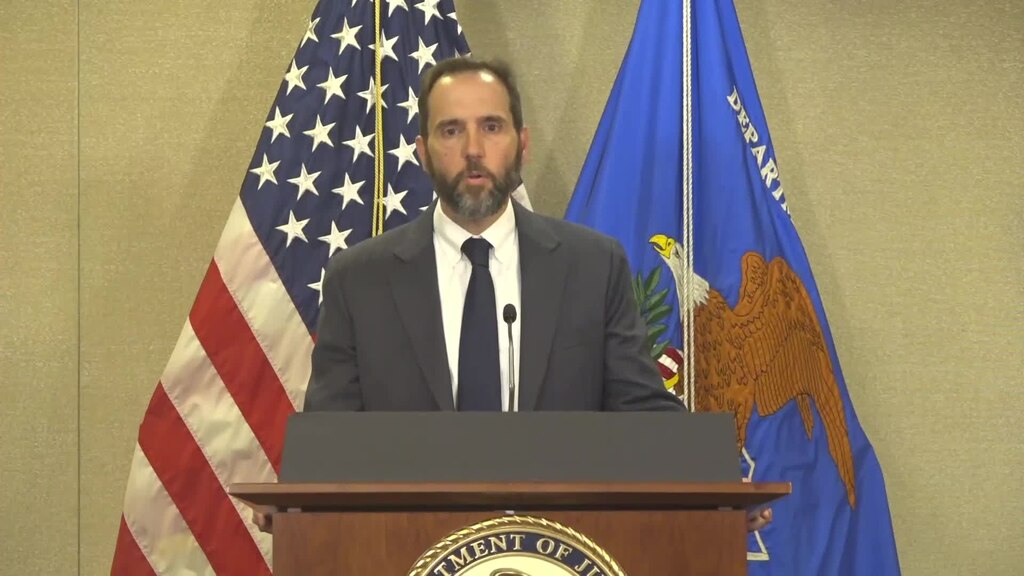Special counsel Jack Smith, despite dropping two high-profile federal cases against President-elect Donald Trump, is making a bold move to restore his authority. On Tuesday, Smith filed a 50-page reply brief with the 11th U.S. Circuit Court of Appeals, arguing that U.S. District Judge Aileen Cannon's decision to dismiss the classified documents case based on his appointment's unconstitutionality was flawed.
Citing a landmark Supreme Court ruling, Smith contended that Attorney General Merrick Garland had the legal authority to appoint him under a statute dating back over 150 years. According to the brief, “Courts, including the Supreme Court in Nixon, had uniformly upheld the Attorney General's appointment of special prosecutors like the Special Counsel.”
Judge Cannon dismissed the federal indictment against Trump in July, ruling that Smith’s appointment as special counsel was unconstitutional. Trump, who pleaded not guilty to 40 counts tied to illegally retaining classified documents at his Mar-a-Lago estate, declared the ruling a victory. However, Smith now seeks to reverse this dismissal, ensuring the legal framework for future special counsels remains intact.
The Legal and Political Implications of Smith’s Move
Smith’s recent brief arrives just days after dropping two major cases against Trump. The first involved classified documents allegedly mishandled by Trump, while the second examined efforts to overturn the 2020 election results, culminating in the January 6 Capitol riot. Both cases were dismissed after Trump’s presidential election victory.
However, Smith’s filing underscores a broader issue: the legitimacy of the Department of Justice’s special counsel program. The brief argued that Cannon misinterpreted the law, emphasizing that the special counsel's role falls under the Attorney General’s supervision and control.
Trump’s legal team has maintained that Smith’s appointment violated constitutional statutes, a claim Smith’s office staunchly opposes. The brief pointed out that the Justice Department, established in 1870, explicitly allows for the hiring of independent prosecutors to handle significant cases. It also highlighted that the Attorney General retains full control over the actions of a special counsel, reinforcing their classification as “inferior officers” rather than principal ones.
Smith emphasized that maintaining this structure is vital to ensuring the executive branch’s independence in handling sensitive and high-profile legal matters.
Public Reaction Fuels Divided Opinions
The news of Smith’s push for restored authority has sparked heated online debates:
- @PatriotGuard2024: “Jack Smith is overstepping again! Let the cases go, Trump won fair and square!”
- @LegalEagle99: “Smith is fighting for the rule of law, not just for himself. This is about future accountability.”
- @Truth4All: “Judge Cannon’s ruling was biased. The Constitution must prevail over political agendas!”
- @MAGA4Life: “Another witch hunt from the left! When will they stop?”
- @JusticeMatters: “This isn’t about Trump; it’s about protecting the justice system from political interference.”
- @ConstitutionalChamps: “Special counsels need autonomy. Smith’s actions protect our legal foundations for years to come.”
What’s Next for the Appeal?
While the 11th Circuit Court granted Smith’s request to drop Trump’s classified documents case on Tuesday, the battle over the legitimacy of his appointment persists. The court’s final decision could set a significant precedent, shaping the role and authority of future special counsels under the Justice Department.



 Trump Orders Federal Agencies to Halt Use of Anthropic AI Technology
Trump Orders Federal Agencies to Halt Use of Anthropic AI Technology  Venezuela Oil Exports to Reach $2 Billion Under U.S.-Led Supply Agreement
Venezuela Oil Exports to Reach $2 Billion Under U.S.-Led Supply Agreement  Trump Floats Ted Cruz for Future U.S. Supreme Court Nomination
Trump Floats Ted Cruz for Future U.S. Supreme Court Nomination  ICE Hiring Surge Raises Vetting Concerns Amid Rapid Expansion
ICE Hiring Surge Raises Vetting Concerns Amid Rapid Expansion  Israel Launches Fresh Strikes on Iran After Death of Supreme Leader Ayatollah Khamenei
Israel Launches Fresh Strikes on Iran After Death of Supreme Leader Ayatollah Khamenei  Trump Floats “Friendly Takeover” of Cuba as Rubio Reportedly Engages in Talks
Trump Floats “Friendly Takeover” of Cuba as Rubio Reportedly Engages in Talks  Israel Declares State of Emergency as Iran Launches Missile Attacks
Israel Declares State of Emergency as Iran Launches Missile Attacks  NYC Mayor Zohran Mamdani Meets President Trump to Tackle Housing Crisis and ICE Detentions
NYC Mayor Zohran Mamdani Meets President Trump to Tackle Housing Crisis and ICE Detentions  Macron Urges Emergency UN Security Council Meeting as US-Israel Strikes on Iran Escalate Middle East Tensions
Macron Urges Emergency UN Security Council Meeting as US-Israel Strikes on Iran Escalate Middle East Tensions  U.S.-Iran Nuclear Talks Show Progress but No Breakthrough Amid Rising Military Tensions
U.S.-Iran Nuclear Talks Show Progress but No Breakthrough Amid Rising Military Tensions  Russia Signals Openness to U.S. Security Guarantees for Ukraine at Geneva Peace Talks
Russia Signals Openness to U.S. Security Guarantees for Ukraine at Geneva Peace Talks  Trump to Address Nation as U.S. Launches Strikes in Iran, Axios Reports
Trump to Address Nation as U.S. Launches Strikes in Iran, Axios Reports  Trump Warns Iran as Gulf Conflict Disrupts Oil Markets and Global Trade
Trump Warns Iran as Gulf Conflict Disrupts Oil Markets and Global Trade  Netanyahu Suggests Iran’s Supreme Leader Khamenei May Have Been Killed in Israeli-U.S. Strikes
Netanyahu Suggests Iran’s Supreme Leader Khamenei May Have Been Killed in Israeli-U.S. Strikes  Trump Launches Operation Epic Fury: U.S. Strikes on Iran Mark High-Risk Shift in Middle East
Trump Launches Operation Epic Fury: U.S. Strikes on Iran Mark High-Risk Shift in Middle East  Pentagon Leaders Monitor U.S. Iran Operation from Mar-a-Lago
Pentagon Leaders Monitor U.S. Iran Operation from Mar-a-Lago  Philippines, U.S., and Japan Conduct Joint Naval Drills in South China Sea to Boost Maritime Security
Philippines, U.S., and Japan Conduct Joint Naval Drills in South China Sea to Boost Maritime Security 
































